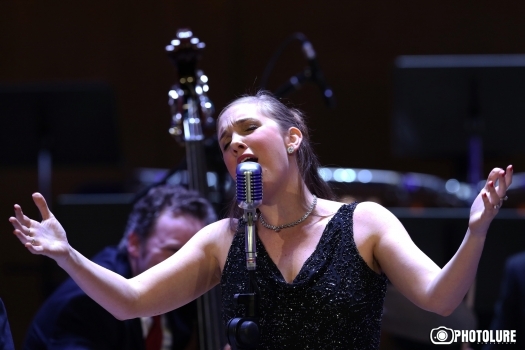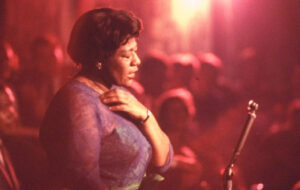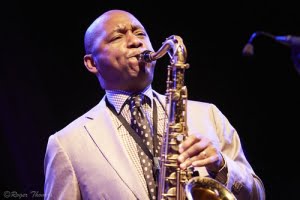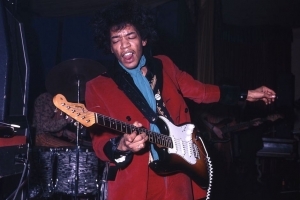Jazz interview with jazz singer Yaala Ballin. An interview by email in writing.
JazzBluesNews.Space: – First let’s start with where you grew up, and what got you interested in music?
Yaala Ballin: – I was born and raised in Israel. Music was always an important element in my family. My siblings and I were sent to the conservatory at the age of 5 or 6 to start our music education. My sister is a professional bassoon player and my brother is an amateur clarinet player. I’ve been singing my whole life. My first instrument was the piano and at the age of 12 I also started playing the flute. Also around then I started taking private lessons with an opera singer.
JBN.S: – What got you interested in picking up the jazz vocal? What teacher or teachers helped you progress to the level of playing you have today? What made you choose the jazz vocal?
YB: – When I was about 15, my sister’s boyfriend brought us 3 jazz albums; “Art Blakey and the Jazz Messengers – A Night In Birdland”, “Chat Baker Sings and Plays” and “Billie Holiday – Lady In Satin.” I fell in love with the music right away. It was the first time I heard anything like it. When the time came to look for a high school, I was excepted to The Thelma Yellin High School For Fine Arts. When I was in 10th grade, I met a singer named Atalia Pniel. She was the one who really got me hooked on jazz singing. She lived in NYC in the 80’s and studied with pianist Barry Harris. She taught me the jazz repertoire and exposed me to the world of improvisation.
JBN.S: – How did your sound evolve over time? What did you do to find and develop your sound?
YB: – Learning jazz music is mostly from listening to recordings, imitating and copying the great musicians that came before us. From the beginning I’ve been listening to different recordings, not only of singers, and sang with them to the best of my ability. I learned the way they phrase and improvise. I believe that your style evolves as you grow. I feel that the more you learn, practice and especially perform, you change and really get to your own sound and style. Also, I’ve learned a lot from living in NYC and going out to hear different artists perform.
JBN.S: – What practice routine or exercise have you developed to maintain and improve your current musical ability especially pertaining to rhythm?
YB: – The most important thing to me as a jazz singer is to deliver the story of the song. So, when I learn a song, the first thing I do is look at the lyrics, the story. With English as my second language I first work out the way I would say the lyrics and not sing them. One exercise I do is to sing the whole song rubato (with no tempo). This allows me to free myself from the written rhythm and focus on how I feel the words should be said. I love discovering how much space I have within the measures. It gives me so much freedom to make the song my own every time I sing it.
JBN.S: – Which harmonies and harmonic patterns do you prefer now? You’re playing is very sensitive, deft, it’s smooth, and I’d say you drift more toward harmony than dissonance. There is some dissonance there, but you use it judiciously. Is that a conscious decision or again, is it just an output of what goes in?
YB: – I love the classic jazz repertoire. I mostly connect to songs from the 1920’s to the 1950’s. On the other hand, I listen to a lot of Be Bop and Hard Bop music. For many years I’ve been listening to Art Blakey, Horace Silver, Charlie Parker, Hank Mobley and more. I feel that my style of improvisation is naturally influenced from those musicians too. Also, most of the musicians I play with now-a-days come form the Be Bop tradition. The accompaniment behind me naturally affects my choice of notes when I improvise.
JBN.S: – How to prevent disparate influences from coloring what you’re doing?
YB: – Everybody starts off by sounding like someone else – That’s just how it was and still is! It’s part of being a jazz artist. With time, you find your voice, develop it and perfect it. One should not skip this step but embrace it and understand that it’s part of the process.
JBN.S: – What do you love most about your new album 2018: <Symphony, Song, Swing, Live!>, how it was formed and what you are working on today.
YB: – “Symphony, Song, Swing!” has been a lifelong dream that came true! Honestly, what I love the most is working with an orchestra and hearing those gorgeous sounds behind me. I never had a chance to play in an orchestra – it is such a strong force. I’m still working on this project today, contacting different orchestras to work with. In addition, I’m working on another concert called “His Name Was Israel Baline”, featuring the lesser known music of Irving Berlin.

JBN.S: – What’s the balance in music between intellect and soul?
YB: – I’m a very analytical person but the stage is the one place I feel total freedom. I think that musicians should practice and work on their skills but when they are on stage, magic is supposed to happen. At that point, you need to trust your body. Part of it is just muscle memory. That’s part of the reason why one can’t really develop just from practicing. You need to be out there, playing and listening to other musicians.
JBN.S: – There’s a two-way relationship between audience and artist; you’re okay with giving the people what they want?
YB: – It is so hard to know what “the people want”. I believe that an artist should not focus on that. One should be true to one’s own style and artistic choices. If what you deliver is true and honest, in some way or another, people will feel it and love it!
JBN.S: – Please any memories from gigs, jams, open acts and studio sessions which you’d like to share with us?
YB: – The most memorable tour I had was my first time in Armenia in 2010!! I met pianist Vahagn Hayrapetyan a few years before through my husband, bassist Ari Roland. Vahagn and I became close friends immediately. In 2010 he organized a 10 day tour in Armenia. I was so excited! I’ve never been to that part of the world and didn’t know what to expect. First of all, I found an unbelievably beautiful country! Vahagn took us to different historical places and I got to see the country side too. Second, I met warm and loving people who just love music and care about cultural. Armenia has so much history and people really care and keep the traditions. Every show we had was sold out – All together, it was such a unique experience! Since then, Armenia has a special place in my heart. Going there is like being at home.
JBN.S: – How can we get young people interested in jazz when most of the standard tunes are half a century old?
YB: – Loving jazz, like many other genres of music, is a musical taste. You obviously can’t force people to like it. On the other hand, jazz is not only about which songs you play but about what you do with them, how you express yourself. I feel that this element of self-expression is actually very attractive to young people.
JBN.S: – John Coltrane said that music was his spirit. How do you understand the spirit and the meaning of life?
YB: – Wow, that’s a very heavy question…. I do agree that music is our spirit. A musician shows its true self through the expression of music., especially singers who can’t hide behind an instrument. Music teaches us a lot about different elements of life; determination, persistence, respect, understanding, listening and more. I feel that to be a full, true artist, one should have a full life with many interests; art and culture, family life, a social life etc. I believe that these wider aspects of life make you a better artist.
JBN.S: – If you could change one thing in the musical world and it would become a reality, what would that be?
YB: – In our modern world, music became so accessible. It’s a blessing because now it’s available for people who might not be able to go out and hear it live. Also, you can listen to artists from different part of the world without traveling. On the other hand, it’s a problem. People should support more live music and performances. One of the many reasons that I was so happy and excited to have our world premier in Armenia was because the Armenian people love music and they support it. We performed at the opera house and the place was over booked – 1700 people!!!
Interview by Simon Sargsyan







More Stories
Traces of the past and lost tracks – Booker Ervin – The In Between: Videos, Photos
The moment of truth at Ella Fitzgerald’s concert 58 years ago… Video, Photos
Branford Marsalis has become increasingly sought after as a featured soloist with acclaimed orchestras: Video